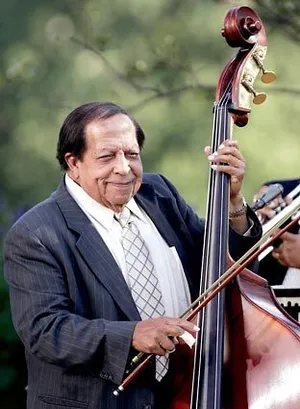
Israel López Valdés, known professionally as Cachao, was a Cuban double bassist, composer, and bandleader whose innovations in Latin music, particularly the mambo and the descarga, have left an indelible mark on the global musical landscape. Born on September 14, 1918, in Habana Vieja, La Habana, Cuba, Cachao’s contributions to music spanned over eight decades, influencing generations of musicians and dancers worldwide.
Early Life and Musical Heritage
Born into a family steeped in musical tradition, Cachao was the younger brother of Orestes López, a renowned composer and bandleader. Their shared musical journey began in their youth, with both brothers playing pivotal roles in the development of Cuban music. At the age of 12, Cachao became a member of the Havana Philharmonic Orchestra, showcasing his prodigious talent early on.
Musical Evolution and the Birth of the Mambo
In the late 1930s, while performing with the Orquesta Arcaño y sus Maravillas, Cachao and his brother Orestes introduced a new rhythm known as the “nuevo ritmo”, which was integrated into danzón compositions. This innovation laid the groundwork for the mambo, a genre that would dominate Latin music in the 1940s and 1950s. Their composition “Mambo” (1938) is often credited as the catalyst for this musical revolution.
The Descarga Phenomenon
Beyond the mambo, Cachao was instrumental in popularizing the descarga, a form of Cuban jam session characterized by spontaneous improvisation. In the late 1950s, he began recording these sessions, which were pivotal in shaping the sound of Latin jazz. These recordings not only showcased his virtuosity but also highlighted his ability to blend classical techniques with Afro-Cuban rhythms, creating a unique and compelling sound.
Exile and International Recognition
Following the Cuban Revolution in 1959, Cachao left Cuba and settled in the United States. He continued to perform and record, collaborating with various artists and bands. However, it was in the 1990s that Cachao experienced a resurgence in popularity. In 1993, Cuban-American actor Andy García produced a documentary titled Cachao… Como Su Ritmo No Hay Dos and an album, Master Sessions Volume 1, both of which introduced Cachao’s music to a new generation and earned him a Grammy Award in 1995.
Later Years and Legacy
Cachao’s later years were marked by continued success and recognition. In 2003, he won a Latin Grammy Award for El Arte del Sabor, a collaboration with Bebo Valdés and Carlos “Patato” Valdés. In 2006, he received an Honorary Doctorate of Music from Berklee College of Music.
Tragically, Cachao passed away on March 22, 2008, in Coral Gables, Florida, at the age of 89. His death marked the end of an era in Latin music, but his influence endures.
Awards and Honors
- 1994: Inducted into Billboard’s Latin Music Hall of Fame.
- 1995: Awarded a National Heritage Fellowship by the National Endowment for the Arts.
- 1999: Inducted into the International Latin Music Hall of Fame.
- 2003: Won a Latin Grammy Award for El Arte del Sabor.
- 2005: Won a Grammy Award for ¡Ahora Sí!.
- 2006: Received an Honorary Doctorate of Music from Berklee College of Music.
- 2012: Posthumously awarded a Grammy Award for The Last Mambo.
Personal Life
Cachao’s personal life was closely intertwined with his musical career. He was survived by his daughter, María Elena López, and his nephew, Orlando “Cachaito” López, a renowned bassist who was a member of the Buena Vista Social Club. His legacy continues through his family and the countless musicians he influenced.
Discography Highlights
- Master Sessions Volume 1 (1994)
- ¡Ahora Sí! (2005)
- El Arte del Sabor (2003)
- The Last Mambo (2012, posthumously)
Conclusion
Israel “Cachao” López’s contributions to Latin music are immeasurable. As a co-creator of the mambo and a master of the descarga, he revolutionized the musical landscape of Cuba and the world. His innovative spirit, technical prowess, and deep understanding of musical traditions have left an indelible mark on the world of music. Cachao’s legacy lives on, not only through his recordings but also through the generations of musicians he inspired and the enduring rhythms he introduced to the world.





